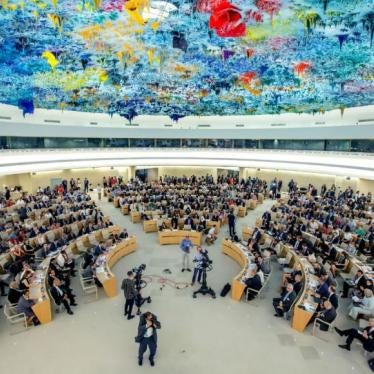On October 11, 193 UN member states cast their secret ballots at the UN General Assembly to select members for the UN’s top rights body, the Human Rights Council. Venezuela was kicked out from the council.
Seventeen countries ran for 14 spots on the 47-nation council for 2023-2025. Venezuela — a country where UN independent experts found evidence that high- level authorities are implicated in crimes against humanity — was one of three candidates for two seats for the Latin America and Caribbean group, running against Chile and Costa Rica.
Most other regional groups did not offer competition on their slates. Noncompetitive regional slates — in which the number of candidates is the same as seats to be filled — hand candidates seats on the council whether or not they deserve them.
In the Latin America and the Caribbean region, UN member states had the chance to choose, and they chose wisely. Chile was elected with 144 votes and Costa Rica with 134, while Venezuela got only 88 of the minimum 97 votes required for a seat.
With China, Eritrea, and Cuba already on the council, and other states with abysmal records elected for new positions, including Bangladesh and Vietnam, the UN rights body will benefit from having one less member that is a walking advertisement for torture and other abuses, and impunity.
Venezuela is a blatant example of governments that do not deserve a seat at the table.
The Nicolás Maduro government is continuing its crackdown on dissent. The country had 244 political prisoners as of September, according to the Venezuelan organization Foro Penal, many in detention centers run by the intelligence services, to which the UN rights office no longer has access. Detainees have faced electric shocks, waterboarding, sexual violence, and other torture.
Security forces killed at least 19,000 people between 2016-2019 in incidents largely officially recorded as “resistance to authorities,” a designation that in practice includes extrajudicial killings. The repression, and the ongoing humanitarian emergency, have forced over 7.1 million Venezuelans to flee their country – the largest migration crisis in the region and one of the most serious globally.
Since 2020, the UN Fact-Finding Mission to Venezuela has found evidence of serious human rights violations and crimes against humanity, including evidence that prosecutors and judges played a direct role in the repression. In November 2021, the International Criminal Court’s Office of the Prosecutor opened its first investigation in Latin America to examine allegations of international crimes committed in Venezuela. In September, the Fact-Finding Mission published a report detailing that the chain of command in the commission of these crimes by the intelligence services implicates Maduro himself.
The Human Rights Council renewed the mission’s mandate on October 7, so it can continue documenting ongoing abuses and ensure accountability. The Venezuelan government’s representative shamefully intervened at the council during the vote attempting — unsuccessfully— to disrupt states expressing their support and calling for council member-states to vote in favor of the resolution. The representative threatened that the resolution would undermine cooperation with the UN high commissioner and possible political negotiations for a transition to democracy. It went wrong.
In 2019, Venezuela narrowly won a seat at the council. During its tenure, Venezuela voted against a council resolution to establish a group of human rights experts on Nicaragua, despite a brutal crackdown on government critics and opponents with arbitrary arrests and prosecutions. In the latest Council session in Geneva, from September 12 to October 7, Venezuela voted against debating the UN high commissioner for human rights’ report documenting crimes against humanity in the Xinjiang Uyghur Autonomous Region of China and establishing a special rapporteur on the situation of human rights in Russia.
UN General Assembly Resolution 60/251, which created the Human Rights Council requires members to “uphold the highest standards in the promotion and protection of human rights” at home and abroad and “fully cooperate with the council.” .
All states sitting at the Council should be willing to be subject to international scrutiny about their human rights records. Venezuelan authorities have undertaken a strategy of apparent, but not genuine, engagement with the Human Rights Council’s procedures and has tried to block any international scrutiny.
Allowing Venezuela’s abusive government to stay on the council for three more years would have undermined the UN’s credibility by rewarding Venezuelan authorities a role in judging other countries’ human rights while they brutalize their population.
Now, regardless of where they place themselves on the ideological spectrum, governments, particularly Latin American ones, should continue to look for avenues to promote accountability for atrocities in Venezuela. No negotiated solution to transition back to democracy is possible without incentives—and international pressure and accountability, including at the Human Rights Council, are essential to create them.








